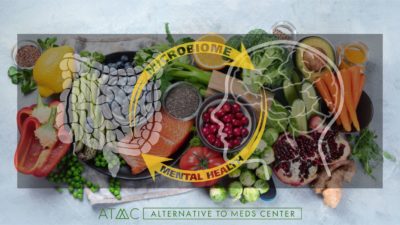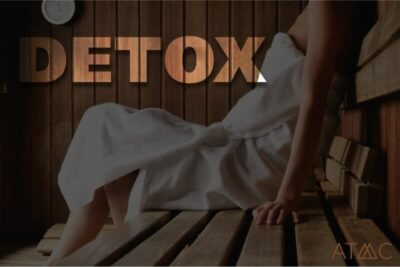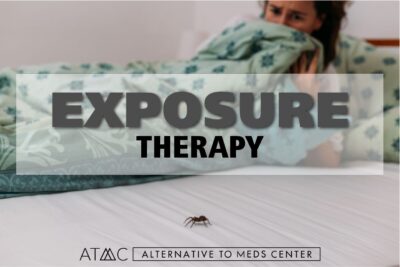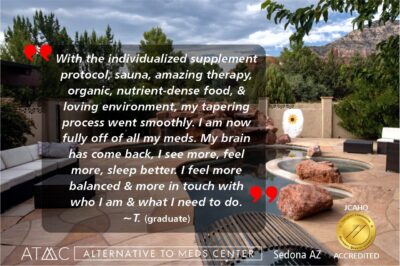1. National Research Council (US) Committee on Diet and Health. Diet and Health: Implications for Reducing Chronic Disease Risk. Washington (DC): National Academies Press (US); 1989. 14, Trace Elements. [cited 2022 June 22]
2. McKnight R, Adida M, Budge K, Goodwin G, Stockton S, Geddes J, “Lithium toxicity profile: a systematic review and meta-analysis.” 2012 Feb 25;379(9817):721-8. DOI: 10.1016/S0140-6736(11)61516-X. Epub 2012 Jan 20 [cited 2022 June 22]
3. Berner L, Kriston L, St. John’s wort for treating depression Cochrane Library [online October 8, 2008] [cited 2022 June 22]
4. McNamara R K, “Mitigation of Inflammation-Induced Mood Dysregulation by Long-Chain Omega-3 Fatty Acids.” Journal of American College of Nutrition 2015;34 Suppl 1(0 1):48-55. DOI: 10.1080/07315724.2015.1080527 [cited 2022 June 22]
5. De Berardis D, Orsolini L, Serroni N, Girinelli G, Iasevoli F, Tomasetti C, de Bartolomeis A, Mazza M, Valchera A, Fornaro M, Perna G, Piersanti M, Di Nicola M, Cavuto M, Martinotti G, Di Giannantonio M. A comprehensive review on the efficacy of S-Adenosyl-L-methionine in Major Depressive Disorder. CNS Neurol Disord Drug Targets. 2016;15(1):35-44. doi: 10.2174/1871527314666150821103825. PMID: 26295824. [cited 2023 Mar 23]
6. LITHIUM CARBONATE LABEL FDA Access Website [cited 2022 June 22]
7. Fountoulakis, Konstantinos & Vieta, Eduard & Bouras, Constantin & Notaridis, Grigorios & Giannakopoulos, Panteleimon & Kaprinis, George. (2006). Long term lithium therapy: a neuroprotective or neurotoxic factor? A systematic review of existing data. Annals of General Psychiatry. 5. 10.1186/1744-859X-5-S1-S329. [cited 2022 June 22]
8. Netto I, Phutane VH. Reversible lithium neurotoxicity: review of the literature. Prim Care Companion CNS Disord. 2012;14(1):PCC.11r01197. doi:10.4088/PCC.11r01197. [cited 2022 June 22]
9. Machado-Vieira R, Manji HK, Zarate CA Jr. The role of lithium in the treatment of bipolar disorder: convergent evidence for neurotrophic effects as a unifying hypothesis. Bipolar Disord. 2009;11 Suppl 2(Suppl 2):92-109. doi:10.1111/j.1399-5618.2009.00714.x [cited 2022 June 22]
10. Hedya SA, Avula A, Swoboda HD. Lithium Toxicity. [Updated 2020 Nov 20]. In: StatPearls [Internet]. Treasure Island (FL): StatPearls Publishing; 2020 Jan. [cited 2022 June 22]
11. Cain T, . LOW-DOSE LITHIUM: AN EFFECTIVE TREATMENT FOR MOOD DISORDERS Naturopathic Doctor News and Review Published 2020 Mar 2 [cited 2022 June 22]
12. Öhlund L, Ott M, Oja S, et al. Reasons for lithium discontinuation in men and women with bipolar disorder: a retrospective cohort study [published correction appears in BMC Psychiatry. 2018 Oct 3;18(1):322]. BMC Psychiatry. 2018;18(1):37. Published 2018 Feb 7. doi:10.1186/s12888-018-1622-1 [cited 2022 June 22]
13. Sansone RA, Forbis JS, Sosa T. Primary care perspectives on treating bipolar disorder: a cross-sectional survey. Prim Care Companion CNS Disord. 2011;13(2):PCC.10m01072. doi:10.4088/PCC.10m01072 [cited 2022 June 22]
14. Lyall L, Penades N, Smith DJ, Changes in prescribing for bipolar disorder between 2009 and 2016: a national-level data linkage study in Scotland Published online by Cambridge University Press: 2019 Feb 28 [cited 2022 June 22]
15. H.E. Sartori, Lithium orotate in the treatment of alcoholism and related conditions, Alcohol, Volume 3, Issue 2, 1986, Pages 97-100, ISSN 0741-8329. [cited 2022 June 22]
16. Lakhan SE, Vieira KF. Nutritional therapies for mental disorders. Nutr J. 2008;7:2. Published 2008 Jan 21. doi:10.1186/1475-2891-7-2 [cited 2022 June 22]
17. Greenblatt J, Grossmann K, Lithium: The Untold Story Of The Magic Mineral That Charges Cell Phones And Preserves Memory January 23, 2017 Metals Resources [cited 2022 June 22]
18. Pacholko AG, Bekar LK. Lithium orotate: A superior option for lithium therapy?. Brain Behav. 2021;11(8):e2262. doi:10.1002/brb3.2262 [cited 2022 June 22]
19. Kling MA, Manowitz P, Pollack IW. Rat brain and serum lithium concentrations after acute injections of lithium carbonate and orotate. J Pharm Pharmacol. 1978 Jun;30(6):368-70. doi: 10.1111/j.2042-7158.1978.tb13258.x. PMID: 26768. [cited 2022 June 22]
20. Marshall T, Lithium as a Nutrient Journal of American Physicians and Surgeons Volume 20 Number 4 Winter 2015 [cited 2022 June 22]
21. Szklarska D, Rzymski P. Is Lithium a Micronutrient? From Biological Activity and Epidemiological Observation to Food Fortification. Biol Trace Elem Res. 2019;189(1):18-27. doi:10.1007/s12011-018-1455-2. [cited 2022 June 22]
22. Sher L. Suicide in men. J Clin Psychiatry. 2015 Mar;76(3):e371-2. doi: 10.4088/JCP.14com09554. PMID: 25830461. [cited 2022 June 22]
23. Schrauzer, G.N., Shrestha, K.P. Lithium in drinking water and the incidences of crimes, suicides, and arrests related to drug addictions. Biol Trace Elem Res 25, 105–113 (1990). [cited 2022 June 22]
24. Cipriani A, Hawton K, Stockton S, Geddes J R, Lithium in the prevention of suicide in mood disorders: updated systematic review and meta-analysis BMJ 2013; 346 (Published 27 June 2013) [cited 2022 June 22]
25. Aucoin M, LaChance L, Cooley K, Kidd S. Diet and Psychosis: A Scoping Review. Neuropsychobiology. 2020;79(1):20-42. doi: 10.1159/000493399. Epub 2018 Oct 25. PMID: 30359969. [cited 2022 June 22]
26. Plitman E, Nakajima S, de la Fuente-Sandoval C, et al. Glutamate-mediated excitotoxicity in schizophrenia: a review. Eur Neuropsychopharmacol. 2014;24(10):1591-1605. doi:10.1016/j.euroneuro.2014.07.015. [cited 2022 June 22]
27. Holstein A, Egberts EH. CNS symptoms caused by hypoglycemia: frequent misdiagnosis: “stroke”. Pitfall of the neuroglycopenia syndrome. MMW Fortschr Med. 1999 Jun 3;141(22):42-4. German. PMID: 10468475. [cited 2022 June 22]
28. Brady WJ Jr, Duncan CW. Hypoglycemia masquerading as acute psychosis and acute cocaine intoxication. Am J Emerg Med. 1999 May;17(3):318-9. doi: 10.1016/s0735-6757(99)90140-7. PMID: 10337905. [cited 2022 June 22]
29. Leonardo Tondo, Nereide Rudas, The course of a seasonal bipolar disorder influenced by caffeine, Journal of Affective Disorders, Volume 22, Issue 4, 1991, Pages 249-251. [cited 2022 June 22]
30. van der Heijden, F., Fekkes, D., Tuinier, S. et al. Amino acids in schizophrenia: evidence for lower tryptophan availability during treatment with atypical antipsychotics?. J Neural Transm 112, 577–585 (2005). [cited 2022 June 22]
31. Environmental Exposures and Depression: Biological Mechanisms and Epidemiological Evidence Annual Review of Public Health Vol. 40:239-259 (Volume publication date April 2019) First published as a Review in Advance on 2019 Jan 11 [cited 2022 June 22]
32. Collaborative on Mental Health and the Environment Mental Health and Environmental Exposures from the Learning and Developmental Disabilities Initiative, 2008 Nov. [cited 2022 June 22]
33. T.S. Sathyanarayana Rao, M. R. Asha, B. N. Ramesh, and K. S. Jagannatha Rao. Understanding nutrition, depression and mental illnesses Indian J Psychiatry. 2008 Apr-Jun; 50(2): 77–82. [cited 2022 June 22]
34. Mittal VA, Vargas T, Osborne KJ, et al. Exercise Treatments for Psychosis: A Review. Curr Treat Options Psychiatry. 2017;4(2):152-166. doi:10.1007/s40501-017-0112-2. [cited 2022 June 22]
35. Hoffer A, Osmond H. TREATMENT OF SCHIZOPHRENIA WITH NICOTINIC ACID. A TEN YEAR FOLLOW-UP. Acta Psychiatr Scand. 1964;40(2):171-89. doi: 10.1111/j.1600-0447.1964.tb05744.x. PMID: 14235254. [cited 2022 June 22]
36. Peet M, Eicosapentaenoic acid in the treatment of schizophrenia and depression: rationale and preliminary double-blind clinical trial results, Prostaglandins, Leukotrienes and Essential Fatty Acids, Volume 69, Issue 6, 2003, Pages 477-485. [cited 2022 June 22]
37. Christensen O, Christensen E, Fat consumption and schizophrenia :Acta Psychiatrica Scandinavica 1988 Nov. [cited 2022 June 22]
38. Petty F, Kramer G, Fulton M, Moeller F G, Rush J, Low Plasma GABA Is a Trait-Like Marker for Bipolar Illness NEUROPSYCHOPHARMACOLOGY 1993-VOL. 9, NO. 2 [cited 2022 June 22]
39. Kraeuter AK, Phillips R, Sarnyai Z. The Gut Microbiome in Psychosis From Mice to Men: A Systematic Review of Preclinical and Clinical Studies. Front Psychiatry. 2020;11:799. Published 2020 Aug 11. doi:10.3389/fpsyt.2020.00799 [cited 2022 June 22]
40. Tanya T. Nguyen, Hugh Hathaway, Tomasz Kosciolek, Rob Knight, Dilip V. Jeste, Gut microbiome in serious mental illnesses: A systematic review and critical evaluation, Schizophrenia Research, 2019 Aug 26, ISSN 0920-9964 [cited 2022 June 22]
41. Emily G. Severance, Robert H. Yolken, William W. Eaton, Autoimmune diseases, gastrointestinal disorders and the microbiome in schizophrenia: more than a gut feeling, Schizophrenia Research, Volume 176, Issue 1, 2016, Pages 23-35, ISSN 0920-9964 [cited 2022 June 22]
42. Krakvik, B., Grawe, R., Hagen, R., Stiles, T., “Cognitive Behaviour Therapy for Psychotic Symptoms: A Randomized Controlled Effectiveness Trial” US National Library of Medicine [Internet] 2013 Mar [cited 2022 June 22]
43. Seikkula J, Olson ME. The open dialogue approach to acute psychosis: its poetics and micropolitics. Fam Process. 2003 Fall;42(3):403-18. doi: 10.1111/j.1545-5300.2003.00403.x. PMID: 14606203. [cited 2022 June 22]
44. Krakvik, B., Grawe, R., Hagen, R., Stiles, T., “Cognitive Behaviour Therapy for Psychotic Symptoms: A Randomized Controlled Effectiveness Trial” US National Library of Medicine [Internet] 2013 Mar [cited 2022 June 22]
45. Health Quality Ontario . Cognitive Behavioural Therapy for Psychosis: A Health Technology Assessment. Ont Health Technol Assess Ser. 2018;18(5):1-141. Published 2018 Oct 24 [cited 2022 June 22]
46. van den Berg DP, de Bont PA, van der Vleugel BM, de Roos C, de Jongh A, Van Minnen A, van der Gaag M. Prolonged exposure vs eye movement desensitization and reprocessing vs waiting list for posttraumatic stress disorder in patients with a psychotic disorder: a randomized clinical trial. JAMA Psychiatry. 2015 Mar;72(3):259-67. doi: 10.1001/jamapsychiatry.2014.2637. PMID: 25607833. [cited 2022 June 22]
47. APA Div 12, Society of Clinical Psychology, “What is Exposure Therapy?” Clinical Practice Guidelines, [Internet] 2017 Jul [cited 2022 June 22]
48. Amminger, Schafer, Papageorgiou, Klier, Cotton, Harrigan, MacKinnon, McGorry, Berger, “Long-chain omega-3 fatty acids for indicated prevention of psychotic disorders: a randomized, placebo-controlled trial” US National Library of Medicine [Internet] 2010 Feb [cited 2022 June 22]
49. Kraeuter AK, Phillips R, Sarnyai Z. The Gut Microbiome in Psychosis From Mice to Men: A Systematic Review of Preclinical and Clinical Studies. Front Psychiatry. 2020;11:799. Published 2020 Aug 11. doi:10.3389/fpsyt.2020.00799 [cited 2022 June 22]
50. Nguyen T, Hathaway H, Kosciolek T, Knight R, Jeste D V, Gut microbiome in serious mental illnesses: A systematic review and critical evaluation, Schizophrenia Research, 2019, Aug 26, ISSN 0920-9964 [cited 2022 June 22]
51. Emily G. Severance, Robert H. Yolken, William W. Eaton, Autoimmune diseases, gastrointestinal disorders and the microbiome in schizophrenia: more than a gut feeling, Schizophrenia Research, Volume 176, Issue 1, 2016, Pages 23-35, ISSN 0920-9964 [cited 2022 June 22]
52. Lyte M, Microbes and brain share neurochemistry Iowa State University College Lundbeck Institute Campus Veterinary Medicine, [Mar 6, 2019]. [cited 2022 June 22]
53. Hoffer A, Orthomolecular Treatment of Schizophrenia Association of Great Britain; [transcript] September 28-30, 1971. [cited 2022 June 22]
54. Hoffer LJ. Vitamin therapy in schizophrenia. Isr J Psychiatry Relat Sci. 2008;45(1):3-10. PMID: 18587164. [cited 2023 Mar 23]
55. Fung T C, Vuong H E, Luna C D G, Pronovost G N, Aleksandrova A A, Riley N G, Vavilina A, McGinn J, Rendon T, Forrest L R, Hsiao E Y, Intestinal serotonin and fluoxetine exposure modulate bacterial colonization in the gut. Nature Microbiology, 2019; DOI: [cited 2022 June 22]
56. Phelps J, Lithium Orotate Psyche Education [September 19, 2014] [cited 2022 June 22]
57. Hasan A, von Keller R, Friemel CM, Hall W, Schneider M, Koethe D, Leweke FM, Strube W, Hoch E. Cannabis use and psychosis: a review of reviews. Eur Arch Psychiatry Clin Neurosci. 2020 Jun;270(4):403-412. doi: 10.1007/s00406-019-01068-z. Epub 2019 Sep 28. PMID: 31563981. [cited 2023 Mar 23]
58. Stuyt E. (2018). The Problem with the Current High Potency THC Marijuana from the Perspective of an Addiction Psychiatrist. Missouri medicine, 115(6), 482–486. [cited 2023 Mar 23]
59. Epp JR, Botly LCP, Josselyn SA, Frankland PW. Voluntary Exercise Increases Neurogenesis and Mediates Forgetting of Complex Paired Associates Memories. Neuroscience. 2021 Nov 1;475:1-9. doi: 10.1016/j.neuroscience.2021.08.022. Epub 2021 Aug 30. PMID: 34464663; PMCID: PMC8682805. [cited 2023 Mar 23]

 Nutritional lithium orotate 11,15,16,35
Nutritional lithium orotate 11,15,16,35 Some exciting research has given us a very clear understanding of the connections between a healthy (or unhealthy) gut microbiome and our mental states.51 A prescription of lithium will not fix a dysregulated microbiome in the gut. Therefore, even with successful lithium discontinuation one would still be advised to at the same time make dietary and other changes to correct a dysfunctional gut microbiome for improvements in one’s mental health. Food sensitivities, inability to break down gluten, other digestion issues, maintaining proper and adequate gut bacteria, and many other factors can have a significant effect on mood, energy, and even the presence or absence of psychiatric symptoms. In treating psychosis, schizophrenia, and other conditions, studies on the impact of diet and correction of nutrition for a healthy and functioning gut microbiome have been revelatory and surprisingly effective, to say the least.49-51
Some exciting research has given us a very clear understanding of the connections between a healthy (or unhealthy) gut microbiome and our mental states.51 A prescription of lithium will not fix a dysregulated microbiome in the gut. Therefore, even with successful lithium discontinuation one would still be advised to at the same time make dietary and other changes to correct a dysfunctional gut microbiome for improvements in one’s mental health. Food sensitivities, inability to break down gluten, other digestion issues, maintaining proper and adequate gut bacteria, and many other factors can have a significant effect on mood, energy, and even the presence or absence of psychiatric symptoms. In treating psychosis, schizophrenia, and other conditions, studies on the impact of diet and correction of nutrition for a healthy and functioning gut microbiome have been revelatory and surprisingly effective, to say the least.49-51 One of the most effective strategies for mental health may be the removal of toxic accumulations from the body.31,32 Alternative to Meds performs this by using safe, non-invasive measures such as nutraceutical-provoked
One of the most effective strategies for mental health may be the removal of toxic accumulations from the body.31,32 Alternative to Meds performs this by using safe, non-invasive measures such as nutraceutical-provoked  Alternative to Meds is a center using social setting-based care, providing a safe space with some features similar to the Open Dialogue Programs that came out of Western Lapland in Finland in the 1980s. These programs focused greatly on family networks and other persons involved in the person’s well-being, with great success. Our program is client-based but does employ peer support as well as personal and group therapies for treatments. Our aim is to use natural alternatives to medication, not just medication alone, to reduce or even eliminate psychiatric symptoms, especially where long-term drug management is not desired or has not proven adequately efficacious. We have similar goals in reducing reliance on medication by utilizing drug-free lithium alternatives, and making gains in personal life functioning, and the ability to get back to work or school, enjoy a higher quality of life, and other signposts of success.43
Alternative to Meds is a center using social setting-based care, providing a safe space with some features similar to the Open Dialogue Programs that came out of Western Lapland in Finland in the 1980s. These programs focused greatly on family networks and other persons involved in the person’s well-being, with great success. Our program is client-based but does employ peer support as well as personal and group therapies for treatments. Our aim is to use natural alternatives to medication, not just medication alone, to reduce or even eliminate psychiatric symptoms, especially where long-term drug management is not desired or has not proven adequately efficacious. We have similar goals in reducing reliance on medication by utilizing drug-free lithium alternatives, and making gains in personal life functioning, and the ability to get back to work or school, enjoy a higher quality of life, and other signposts of success.43 Programs at Alternative to Meds are customized for each client. We can draw from many forms of CBT and other therapy for psychotherapeutic treatments. Whether a client wants to work through personal issues, face fears in a safe space with the support of trained therapists, or learn more about techniques to balance mood swings and anxieties, this work is extremely beneficial and does not require medication to be successful.
Programs at Alternative to Meds are customized for each client. We can draw from many forms of CBT and other therapy for psychotherapeutic treatments. Whether a client wants to work through personal issues, face fears in a safe space with the support of trained therapists, or learn more about techniques to balance mood swings and anxieties, this work is extremely beneficial and does not require medication to be successful. For over 15 years we have been helping our clients address mood swings, depression, anxiety, and other unwanted conditions by safely transitioning away from toxic prescription drugs and over to an effective regimen of natural methods and strategies that result in mental health naturally. The focus of our programs is always to aim for finding and
For over 15 years we have been helping our clients address mood swings, depression, anxiety, and other unwanted conditions by safely transitioning away from toxic prescription drugs and over to an effective regimen of natural methods and strategies that result in mental health naturally. The focus of our programs is always to aim for finding and 







